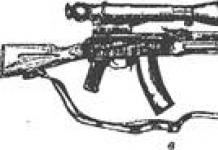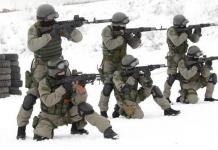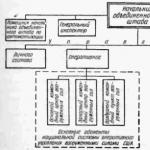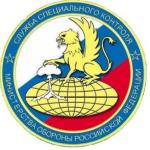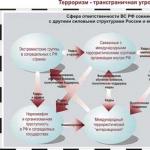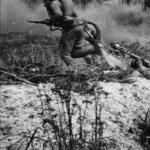1887 - 1964 Russian poet, translator. Verses, fairy tales, plays for children. Translations of R. Burns, W. Shakespeare's sonnets, fairy tales different peoples etc. Philosophical miniatures ("Selected Lyrics", 1962; Lenin Prize, 1963), lyrical epigrams. Literary criticism (book "Education with a word", 1961). The book of memoirs "At the beginning of life" (1960). State Prizes of the USSR (1942, 1946, 1949, 1951).
Biography
Marshak Samuil Yakovlevich (1887 - 1964), poet, translator.Born on October 22 (November 3 NS) in Voronezh in the family of a factory technician, a talented inventor who supported in children the desire for knowledge, interest in the world, in people. Early childhood and spent his school years in the town of Ostrogozhsk near Voronezh. In the gymnasium, the teacher of literature instilled a love for classical poetry, encouraged the first literary experiments of the future poet. One of Marshak's poetry notebooks fell into the hands of V. Stasov, a well-known Russian critic and art historian, who took an ardent part in the fate of the young man. With the help of Stasov, he moved to St. Petersburg, studied at one of the best gymnasiums, spent whole days in the public library where Stasov worked.
In 1904, at Stasov's house, Marshak met Gorky, who took great interest in him and invited him to his dacha in Yalta, where Marshak was treated, studied, read a lot, met with different people. When the Gorky family was forced to leave the Crimea due to repressions after the revolution of 1905, Marshak returned to St. Petersburg, where his father had moved by that time, who worked at a factory beyond the Nevskaya Zastava.
Labor youth began: going to lessons, collaborating in magazines and almanacs.
A few years later, in 1912, to complete his education, Marshak went to study in England, first at the Polytechnic, then at University of London. During the holidays, I traveled a lot on foot in England, listening to English folk songs. Even then he began to work on translations of English ballads, which later glorified him.
In 1914 he returned to his homeland, worked in the provinces, published his translations in the journals Northern Notes and Russian Thought. During the First World War, Marshak was involved in helping refugee children.
Since the early 1920s, he has been involved in the organization of orphanages in Yekaterinodar, created a children's theater, in which his work as a children's writer began.
In 1923, having returned to Petrograd, he created his first original fairy tales in verse - "The Tale of the Stupid Mouse", "Fire", "Mail", translated children's folk songs from English - "The House That Jack Built", etc. He headed one of the first Soviet children's magazines - "New Robinson", around which talented children's writers were grouped. Since 1924, he headed the children's department of the OGIZ in Leningrad and was an active patron of avant-garde artists, such as the Oberiuts (D. Kharms, A. Vvedensky), E. Schwartz, B. Zhitkov, who, under his leadership, began to write for children.
Marshak's poems for children, his songs, riddles, fairy tales and sayings, plays for the children's theater eventually made up the collection "Tales, Songs, Riddles", repeatedly reprinted and translated into many languages.
His books for children, which are short stories in verse, - "Baggage", "Mr. Twister", "Blitz Fritz", are rich in content and form, they try to cover all aspects of life accessible to the child and at the same time correspond to modern topics.
In 1938 he moved to Moscow. During the years of the Great Patriotic War actively collaborated in newspapers - his parodies, epigrams, political pamphlets ridiculed and denounced the enemy.
In the post-war years, books of poems were published - "Military Post", "Fairy Tale", a poetic encyclopedia "Merry Journey from A to Z". In 1955, 1957, 1959 Marshak traveled to England again. He did a lot of translations of Shakespeare's sonnets and songs of R. Burns, translated poems by J. Keats, R. Kipling, W. Wadsworth, P. B. Shelley, J. Byron.
Among Marshak's dramatic works, the fairy-tale plays "Twelve Months", "Smart Things", "Cat's House" are especially popular.
In 1961, a collection of articles entitled "Education with a Word" was published - the result of the writer's great creative experience.
In 1963, "Selected Lyrics" was published - the last book of the writer. Marshak's lyrics, not intended for children, are distinguished by simplicity, concreteness, and clarity. His poetic style is conservative and classical, the language of his works is close to colloquial speech.
Samuil Yakovlevich Marshak — Russian Soviet poet, playwright, translator, literary critic. Marshak's biography begins in a new style on October 22 (November 3), 1887 in Voronezh. As a boy, Marshak began to write poetry early. In 1902, V.V. Stasov drew attention to a talented child, who introduced Samuil to M. Gorky. This acquaintance became very important for the further biography of Marshak. In 1904-1906. Marshak lived in the family of M. Gorky in Yalta.
The "real" writer's biography of Marshak begins in 1907, when his first printed publications came out. In 1912-1914. Samuil Marshak listens to lectures at the Faculty of Art of the University of London. From 1915, the first translations of Marshak from English poetry began to appear in Russian journals.
In 1920, Marshak lived in Krasnodar, where he organized one of the country's first theaters for children. In 1923, Samuil Marshak's first poetry books for the little ones were published: "The House That Jack Built", "Children in a Cage", "The Tale of the Stupid Mouse". So in the biography of Marshak appears and occupies great place creativity for children.
In 1923-1925 Marshak headed one of the first Soviet children's magazines "New Robinson". From 1924 he headed the children's department of the OGIZ in Leningrad. For a number of years, Marshak headed the Leningrad edition of Detgiz, Lengosizdat, and the Young Guard publishing house. In 1934, at the First Congress of Soviet Writers, Marshak made a report on children's literature and was elected a member of the board of the USSR Writers' Union. Marshak's biography makes a sharp turn towards literary administration, so in 1938 Samuil Yakovlevich moved to Moscow. In 1939-1947 he was a deputy of the Moscow City Council of Workers' Deputies.
During the Great Patriotic War, Samuil Marshak worked in newspapers and collaborated with the Kukryniksy. His parodies, epigrams, political pamphlets ridiculed and denounced the enemy. In the post-war years, books of poems were published - “Military Post”, “Fairy Tale”, a poetic encyclopedia “A Merry Journey from A to Z”.
In 1955, 1957, 1959 Marshak traveled to England again. He did a lot of translations of Shakespeare's sonnets and songs of R. Burns, translated poems by J. Keats, R. Kipling, W. Wadsworth, P. B. Shelley, J. Byron. E. Lear, A. A. Milne, J. Austin, as well as works by Ukrainian, Belarusian, Lithuanian, Armenian and other poets. He also translated poetry by Mao Zedong. In turn, the books of Marshak himself have been translated into many languages of the world.
In 1961, a collection of articles by Samuil Marshak "Education with a word" was published - the result of the great creative experience of the writer. In 1963, his book "Selected Lyrics" was published, which became the last in Marshak's biography.
Marshak is a four-time winner of the Stalin Prize. He was awarded two orders of Lenin, the Order of the Patriotic War of the 1st degree and the Order of the Red Banner of Labor, laureate of the Lenin Prize.
Samuil Yakovlevich Marshak - famous poet and playwright. He is known as the author of children's fairy tales, poems, but also as the author of more serious, "adult" works.
The writer was born on October 22, 1887 in Voronezh. The surname "Marshak" is translated as "our teacher".
At first, little Marshak studied at a gymnasium near Voronezh. Teachers considered him gifted and very talented. The young poet writes his first works while still at school.
In 1911, the writer becomes a correspondent and goes on a journey. At this time, Marshak wrote his best and most heartfelt poems, and also meets the girl Sophia, his future wife.
Young people got married and left for England. Here Samuil Yakovlevich begins to study at the University of London, translate from of English language famous works of Shakespeare, Kipling and other authors. Marshak's translations became very famous and popular.
Then the writer returned to Russia. Here he continues to write works for children, and also organizes several children's theaters.
Everyone knows the poems and fairy tales of Marshak. However, few people know that he also created a lot of serious literature. He received many awards in the field of literature.
Samuil Yakovlevich is loved and remembered to this day. Streets are named after him, memorial plaques are erected in his honor. Samuil Marshak is alive in the hearts of people.
Marshak Samuil Yakovlevich detailed biography
Samuil Yakovlevich Marshak is our poet, theatergoer, language, literary critic, screenwriter. Was born on 22.11. 1887 in the city of Voronezh, in the family of a self-taught, gifted chemist Yakov Mironovich Marshak. The father often changed jobs, so they moved to a new place every now and then. In Ostrogozhsk, Samuil received knowledge at the gymnasium. Marshak had a poetic gift long before he began to write. He owed this to Vladimir Ivanovich Teplykh, his gymnasium teacher.
Soon his father found a job in St. Petersburg, and the whole family moved there. Only now Marshak and his older brother had to stay in their homeland. They had to enter the St. Petersburg gymnasium, but for this they had to retake the exams. For Marshak, this was almost impossible - there is no necessary knowledge. And by the will of fate in the summer in St. Petersburg, he met the famous critic V. V. Stasov. This man became for him a bridge to the writing environment. He introduced the young man to the work of Turgenev, Herzen, Goncharov, Leo Tolstoy. In 1902, Stasov was busy with the transfer of Marshak to the St. Petersburg 3rd gymnasium. In it, Marshak deeply studied ancient languages. Stasov often took Marshak to the Public Library, where he was in charge of the art department.
Marshak had the opportunity to communicate there with famous and novice professors and students, composers, artists and writers. Vladimir Stasov was engaged in the spiritual education of the future writer. He first introduced him to Russian folklore. In 1904, Marshak met Alexei Maksimovich Gorky. They met by chance and fatefully in country house near Stasov, in the village of Storozhilovka. Soon, after this meeting, Marshak leaves to live in Yalta. Gorky invited him there, having learned that Marshak was often sick in St. Petersburg. Gorky sends him a letter informing him that Marshak has been accepted into the Yalta gymnasium. Now Marshak lives in the family of Alexei Gorky, with his mother Ekaterina Peshkova. A revolution was coming. The Peshkovs went abroad. Marshak was left alone. He was forced to rent a room, to give lessons.
During this period, he became interested in Ibsen, Hauptmann, Maeterlinck, Poe, Baudelaire, Verlaine, Oscar Wilde, symbolist poets. But the loneliness did not last long. In the winter of 1906, in order to avoid arrest, he had to return to St. Petersburg. Stasov died. Thus began the literary path of S. Marshak.
He has been published since 1907 in literary magazines, in the "Satyricon" and many others. In 1912, Samuil, together with his wife, Sophia Mikhailovna, moved to study abroad. He entered the English University as a philologist. Marshak became close to London literature through the university library. Here he discovered folklore for children. It was in England that Marshak began to recreate mother tongue English poems, songs and jokes.
At first, Marshak's small family lived very poorly. He published his translations of the English authors Wordsworth and Blake, published in St. Petersburg in 1915-1917 in the journal Severny Zapiski and Russkaya Mysl. Marshak began to study literature for children in Voronezh. He arrived there from England at the beginning of 1915, the first World War. He came to be drafted into the army, but because of poor eyesight he was not taken. In Voronezh, his main job was to help the children of Jewish refugees. It was there that his first children's books were born.
In the summer of 1917 the Marshak family moved to Krasnodar. Marshak wrote in a local newspaper, and then led circles in orphanages and colonies. In 1920, Marshak, together with the writers and composers, organized a theater - "Children's Town". Under him there was a school, a kindergarten, a library, carpentry and metalwork workshops and various circles. Plays for performances were written by Marshak himself and the poet E. I. Vasilyeva-Dmitrieva. "Children's Town" existed for two years (1920 - 1922). Then the Leningrad Theater of the Young Spectator was created, which also existed for two years - (1922 - 1924). Then the editorial office of the magazine "New Robinson" (1924-1925), the children's and youth department of Lengosizdat, and then the "Young Guard" and, finally, the Leningrad editorial office of Detgiz (1924-1937). Opportunities opened up to Marshak and the New Robinson editorial staff when they started working at the publishing house.
Marshak did not know that Alexei Maksimovich Gorky was closely watching his work from abroad. And in 1927, Gorky sent him a laudatory letter from Sorrento. Since then, Gorky again took Marshak under his wing. He helped him publish children's books. In 1933, Marshak was left without a mentor - Gorky died. In 1937, the editorial office of the publishing house broke up. Marshak moved to Moscow. Editing took up a lot of his time. But still Marshak did not cease to engage in his own literature. In 1962, he published his first book, Selected Lyrics.
In 1154, in the family of Prince Yuri Dolgoruky, from his second marriage, younger son Vsevolod. Subsequently, the death of the pope, the eldest son Andrei Yurievich became the head of the Vladimir-Suzdal state.
The personality of Prince Igor Svyatoslavovich in the history of the Russian land is ambiguous. Some historians consider him an insignificant historical figure, who did not distinguish himself in any significant way. Others say that the location of his principality
Samuil Yakovlevich Marshak (1887-1964) - Russian Soviet poet, playwright, translator, literary critic.
Laureate of Lenin (1963) and four Stalin Prizes (1942, 1946, 1949, 1951).
Marshak. Biography
Samuil Marshak Born October 22 (November 3), 1887 in Voronezh, in a Jewish family, his father, Yakov Mironovich (1855-1924), worked as a foreman at a soap factory. Mother - Evgenia Borisovna Gitelson - was a housewife. The surname "Marshak" is an abbreviation (Hebrew מהרש"ק) meaning "Our teacher Rabbi Aaron Shmuel Kaidanover" and belongs to the descendants of this famous rabbi and talmudist (1624-1676).
Samuil spent his early childhood and school years in the town of Ostrogozhsk near Voronezh. He studied in 1898-1906 at the Ostrogozhsk, 3rd St. Petersburg and Yalta gymnasiums. In the gymnasium, the teacher of literature instilled a love for classical poetry, encouraged the first literary experiments of the future poet, and considered him a child prodigy.
One of Marshak's poetry notebooks fell into the hands of V. V. Stasov, a well-known Russian critic and art critic, who took an ardent part in the fate of the young man. With the help of Stasov, Samuel moved to St. Petersburg and studied at one of the best gymnasiums. He spends whole days in the public library where Stasov worked.
In 1904, at Stasov's house, Marshak met Maxim Gorky, who treated him with great interest and invited him to his dacha in Yalta, where Marshak lived in 1904-1906. He began to print in 1907, publishing the collection Zionides, dedicated to Jewish topics; one of the poems was written on the death of Theodor Herzl. At the same time, he translated several poems by Chaim Bialik from Yiddish and Hebrew.
When the Gorky family was forced to leave the Crimea because of the repressions of the tsarist government after the revolution of 1905, Marshak returned to St. Petersburg, where his father, who worked at a factory behind the Nevskaya Zastava, had moved by that time.
In 1911, Samuel Marshak, together with his friend, the poet Yakov Godin, and a group of Jewish youth made a long journey through the Middle East: from Odessa they sailed on a ship, heading to the countries of the Eastern Mediterranean - Turkey, Greece, Syria and Palestine. Marshak went there as a correspondent for the Petersburg Vseobshchaya Gazeta and Blue Journal. The lyrical poems inspired by this trip are among the most successful in the work of the young Marshak ("We lived in a camp in a tent ..." and others).
On this trip, Marshak met his future wife, Sophia Mikhailovna Milvidskaya (1889-1953), and soon after their return they got married. At the end of September 1912, the newlyweds went to England. There Marshak studied first at the Polytechnic, then at the University of London (1912-1914). During the holidays, he traveled a lot on foot in England, listening to English folk songs. Even then he began to work on translations of English ballads, which later glorified him.
In 1914, Marshak returned to his homeland, worked in the provinces, published his translations in the journals Northern Notes and Russian Thought. During the war years, he was involved in helping refugee children.
In 1915, together with his family, he lived in Finland in the natural sanatorium dock. Lübeck.
In 1920, while living in Yekaterinodar, Marshak organized a complex of cultural institutions for children there, in particular, he created one of the first children's theaters in Russia and wrote plays for it. In 1923, he published his first poetic children's books (The House That Jack Built, The Caged Kids, The Tale of the Stupid Mouse). He is the founder and first head of the English language department of the Kuban Polytechnic Institute (now the Kuban State Technological University).
In 1922, Marshak moved to Petrograd, together with the folklorist Olga Kapitsa, led the children's writers' studio at the Institute preschool education Narkompros, organized (1923) children's magazine"Sparrow" (in 1924-1925 - "New Robinson"), where, among others, such masters of literature as B. S. Zhitkov, V. V. Bianki, E. L. Schwartz were published. For several years, Marshak also led the Leningrad editorial office of Detgiz, Lengosizdat, and the Young Guard publishing house. Was related to the magazine "Chizh". He led the "Literary Circle" (at the Leningrad Palace of Pioneers). In 1934, at the First Congress of Soviet Writers, S. Ya. Marshak made a report on children's literature and was elected a member of the board of the USSR Writers' Union. In 1939-1947 he was a deputy of the Moscow City Council of Workers' Deputies.
In 1937, the children's publishing house created by Marshak in Leningrad was destroyed, its best pupils were repressed - A.I. Vvedensky, N.M. Oleinikov, N.A. Zabolotsky, T.G. fired. In 1938 Marshak moved to Moscow.
During the Great Patriotic War, the writer actively worked in the genre of satire, publishing poems in Pravda and creating posters in collaboration with the Kukryniksy.
Marshak donated large sums of money for boarding schools established in Lithuania and kindergarten for Jewish orphans whose parents died during the Holocaust. At the end of 1945 and at the beginning of 1946, when the secret transfer of these children through Koenigsberg to Poland, and from there to Palestine, began, Marshak sent a large amount of money for these purposes.
In 1960, Marshak published the autobiographical story "At the Beginning of Life", in 1961 - "Education with a Word" (a collection of articles and notes on poetic skill).
Almost all the time literary activity(more than 50 years) Marshak continues to write both poetic feuilletons and serious, “adult” lyrics. In 1962, he published the collection "Selected Lyrics"; he also owns a separately selected cycle "Lyrical Epigrams".
Marshak is the author of translations of sonnets by William Shakespeare, songs and ballads by Robert Burns, poems by William Blake, W. Wordsworth, J. Keats, R. Kipling, E. Lear, A. A. Milne. As well as works by Ukrainian, Belarusian, Lithuanian, Armenian and other poets. He also translated poetry by Mao Zedong.
Marshak's books have been translated into many languages of the world. For translations from Robert Burns, Marshak was awarded the title honorary citizen Scotland.
Marshak stood up for Brodsky and Solzhenitsyn several times. For the first, he demanded "to get translations of texts on Lenfilm as soon as possible", for the second he stood up for Tvardovsky, demanding that his works be published in the journal New world. He always stood up for the disgraced writers of that time.
His last literary secretary was Vladimir Pozner
Samuil Yakovlevich Marshak died on July 4, 1964 in Moscow. He was buried at the Novodevichy Cemetery (plot No. 2).
Marshak Samuil Yakovlevich (1887-1964)
Samuil Yakovlevich Marshak was born on November 3 (October 22 - according to the old style), 1887 in the city of Voronezh. His father, Yakov Mironovich, a master chemist by profession, was a man of versatile abilities, was very fond of literature and knew several foreign languages. He managed to instill in his children with early years desire for knowledge, respect for human labor, for any skill.
Marshak's early childhood and school years were spent in the town of Ostrogozhsk near Voronezh, in a workers' settlement near the plant. The future poet fell in love with poetry early. At the age of four, he already tried to compose poetic lines himself. And at the age of eleven, when he began to study at the gymnasium, Samuel was already translating the ancient Roman poet Horace.
When Marshak was 15 years old, his fate suddenly changed. One of Marshak's poetry notebooks fell into the hands of Vladimir Vasilievich Stasov, a well-known Russian critic and art critic, who took an ardent part in the fate of the young man. Marshak found himself in the northern capital, in big house, where the most famous artists, musicians, and writers of that time visited. He saw the magnificent St. Petersburg museums, visited exhibitions, theaters and concerts, studied at the best metropolitan gymnasium. In the St. Petersburg Public Library, where Stasov worked, young Marshak spent whole days looking at old books and engravings.
A few years later, to complete his education, Marshak went to study in England. In order to better learn the language, in order to hear the people's speech, he made a long journey on foot through the English provinces. While living in England, he came to know and love English poetry and began translating English poets and folk ballads and songs.
Summer 1914, shortly before the outbreak of World War I, Marshak returned to Russia. During the war and during the years of the revolution, Samuil Yakovlevich lived in the south of Russia - in Voronezh and Krasnodar. Here at that time there were many refugee children from those regions that were occupied by the Germans, many homeless children. Marshak did a great job of organizing help for children. In Krasnodar, he organized a whole "Children's Town" - a complex of children's institutions with a school, kindergartens, a library, amateur art circles and a theater for children. Together with the poetess E.I. Vasilyeva Marshak wrote plays for children "The Tale of the Goat", "Cat's House" and others. Marshak's work in children's literature began with them.
In 1922 Marshak returned to Petrograd, where he created his first original fairy tales in verse. In the 20s, his books were published: "Children in a Cage", "Fire", "The Tale of the Stupid Mouse", "Luggage", "Mail", "The Story of an Unknown Hero", "Mr. Twister", "The House that Built Jack” and many other books of poetry, which later became classics of children's reading.
But Samuil Yakovlevich not only wrote children's books. He was an outstanding editor and organizer of children's literature. He united around himself such talented children's writers and poets as Agniya Barto, Sergei Mikhalkov, Boris Zhitkov, Arkady Gaidar, Leonid Panteleev and many others and helped create the world's first children's book publishing house.
Marshak's poetic gift is versatile and varied. During the Great Patriotic War, S.Ya. Marshak published satirical epigrams, parodies, and pamphlets in newspapers that ridiculed and denounced the enemy.
Throughout his life, Marshak translated a lot. Entire volumes in his collected works are taken up by transcriptions from English and Scottish poets, beginning with full translation Shakespeare's sonnets and ending with examples of children's poetry. His translations, as a rule, remain either unsurpassed or among the best today.
The result of the great creative experience of the writer was a collection of articles "Education with a word", published in 1961. In the same year, his autobiographical novel "At the Beginning of Life" was published.
The writer's last book, Selected Lyrics, was published in 1963. The poems included in this book were created over many years.
Marshak died on July 4, 1964 in Moscow. Before last day he worked, he ruled proofreading in the hospital, making sure that he was honorably responsible for his every word.
One of the last poems by S.Ya. Marshak was it (1963) :
The world will disappear at that very hour,
When I disappear
How he died for your eyes,
Departed friends.
There will be no sun and moon,
All flowers fade.
There won't even be silence
There will be no darkness...
No, the world will exist
And even if I'm not in it,
But I managed to embrace the whole world,
All millions of years.
I thought, I felt, I lived
And all that I could, comprehended,
And this right deserved
For your immortal moment.

The writer lived a long life, wrote many poems, plays, fairy tales, literary articles. Korney Ivanovich Chukovsky, welcoming Marshak at one of the anniversaries, said that in his person he welcomed five Marshaks at once: a children's poet, playwright, lyric poet, translator and satirist. And the literary critic S. Sivokon added five more to these five: prose writer, critic, editor, teacher, theorist of children's literature. “Ten Marshaks,” writes S. Sivokon, “embodied in one, are not ten heads of a fairy-tale snake, arguing among themselves and preventing him from living. No, these are ten sides of a multifaceted, but surprisingly integral personality, whose name is Samuil Yakovlevich Marshak.
Samuil Marshak is still one of the main children's writers in Russia today. , it is his poems for many children that become the very first in life. Years pass, eras and generations change, but his works are always modern and invariably enjoy great popularity among young readers.
